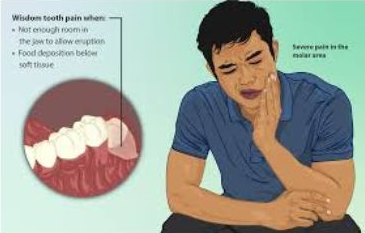

wisdom-teeth
Can Wisdom Teeth Cause Headache?
What is the relationship between wisdom teeth and headaches?
Third molars, or the rear teeth, are known as wisdom teeth. A person’s first wisdom teeth normally erupt at 17 to 21. The four wisdom teeth in each mouth corner are present in most of the population. It is possible that wisdom teeth will not correctly emerge if there is insufficient room for them to grow in. When this occurs, the wisdom teeth are referred to as impacted. Impacted teeth can cause a variety of health issues. Infection, crowding, and pain can all be caused by these devices. They may grow at an angle, causing problems with cleaning.
How can you tell if you have wisdom teeth in your mouth?
There’s a chance you won’t discover that you have wisdom teeth until they start to appear or create difficulties. An oral x-ray may reveal the emergence of wisdom teeth. Your dentist or oral surgeon would likely recommend that you have your wisdom teeth removed if you are experiencing any discomfort, swelling, or infection.
What are the problems of keeping wisdom teeth in place?
In cases when wisdom teeth are impacted (stuck) or just partially erupted (coming in), cleaning and removing plaque and tartar can be challenging. As a result, gum disease can develop around the wisdom teeth. Other teeth might be damaged by wisdom teeth that are impacted or misaligned. The impacted wisdom teeth can become infected with fluid-filled sacs or tumors. While wisdom teeth can be removed, there are certain advantages to leaving them in place.
Do I need to see a dentist about my wisdom teeth?
f you’re experiencing headaches and think your wisdom teeth are the reason behind it, make an appointment with your dentist immediately. Your dentist will examine your mouth to see if your wisdom teeth cause headaches. If they are, your dentist will likely recommend having them removed.
Treatments for wisdom teeth headaches:
Wisdom teeth are notoriously difficult to deal with. They can be affected and cause a wide range of issues if they come in too late.
Here are a few things you may do to alleviate the pain caused by wisdom teeth.
Take aspirin to ease the pain.
You may suffer discomfort and irritation when your wisdom teeth begin to erupt. These symptoms can be alleviated by taking aspirin, which reduces inflammation and discomfort. For quick relief, place one aspirin tablet on the afflicted region and hold it there for a few minutes. Taking aspirin will ease your discomfort and allow you to eat and drink more comfortably. Pre-bedtime aspirin can help ease pain and inflammation, as might taking ibuprofen. Do not take aspirin on an empty stomach; doing so may result in nausea and vomiting. Be sure to drink enough water before and after taking aspirin.
Make an appointment with your dentist as soon as possible if you’re experiencing chronic or severe discomfort. Pain medicine, either over the counter or prescribed, may be prescribed. Wisdom teeth may need to be surgically removed in some circumstances. The discomfort and inflammation caused by wisdom teeth can be alleviated by taking aspirin as a preventative measure.
Combination treatment utilizing both heat and cold:
Alternating hot and cold compresses is another home treatment. The cold numbs the region and reduces swelling, but the heat can assist decrease inflammation. Cover the compress in a towel before using it to avoid damaging your teeth or gums. You may also use your fingers to massage the region. Use this method to alleviate discomfort and relax the gums surrounding the tooth. Before attempting any new home cure, always check with your physician. Despite the discomfort that wisdom teeth might cause, they can be successfully removed with proper care.
Use a saltwater rinse to finish cleaning.
Simple salt water rinsing can help soothe wisdom toothache. In addition to reducing pain, salt water can assist remove pus that has built up around the tooth. In addition, it can aid in the healing process by removing toxins from the region. You could attempt salt water rinsing the next time you get discomfort in your wisdom teeth.
Removing Wisdom Teeth:
Your dentist may be able to remove your wisdom teeth if they are causing severe headaches. One of the most typical procedures for wisdom teeth removal is to have it done by an oral surgeon. A local anesthetic numbs the region surrounding your mouth during the procedure. To make you more comfortable, sedation is an option. It usually takes a few days up to a week to recover from having your wisdom teeth removed. Foods that are easy to swallow and painkillers are essential during this period.
The dangers of removing wisdom teeth
The dangers of removing wisdom teeth are the same as any surgical procedure. Infection, nerve injury, and bleeding are just a few examples. The wisdom teeth may not be affected in certain circumstances and can be removed without surgical intervention. As a rule, though, this is not the case.
Wisdom teeth can cause a variety of other issues.
Wisdom teeth can also lead to more serious issues, such as:
Crowding
When wisdom teeth erupt, they may squeeze other teeth and lead to misalignment. Tooth decay can result from not being able to clean your teeth adequately.
Infection
It’s possible that wisdom teeth that have gotten impacted will collect germs and food particles at the gum line. Because of this, it is possible to develop an infection, which may be extremely painful and difficult to cure.
Cysts
Cysts can grow around the wisdom teeth. Teeth can be damaged if left untreated for long periods.
Tumors
Wisdom teeth may get infected with malignancies in rare circumstances. Rarely, they may be malignant while being benign most of the time.
Conclusion
A range of issues, such as headaches, can arise from impacted wisdom teeth. Your dentist should be seen immediately if you are getting headaches and believe your wisdom teeth are to blame. For example, they can identify if wisdom teeth are to blame for discomfort and propose the best course of action.
Many of the issues linked with wisdom teeth may be avoided with good treatment. Brush and floss your teeth at least twice daily, and schedule a yearly appointment with your dentist. Don’t put off getting your wisdom teeth checked out if you notice any discomfort. You may greatly reduce the risk of tooth and gum damage if you take action early enough.
FAQ’s
How can I tell if my headaches are caused by the eruption of my third molars?
Make an appointment with your dentist if you suspect your wisdom teeth are causing a new or unusual headache. For example, they can identify if wisdom teeth are to blame for discomfort and propose the best course of action.
Will Having My Wisdom Teeth Removed Put Me at Risk?
Like any other surgical procedure, wisdom teeth extraction might result in complications. Infection, nerve injury, and bleeding are just a few examples. The wisdom teeth may not be impacted in some circumstances. It is possible to get rid of them without resorting to surgery. In other cases, though, this isn’t the case.
What can I do to keep my wisdom teeth healthy?
Many of the issues linked with wisdom teeth may be avoided with good treatment. Regular dental examinations and brushing and flossing are essential to good oral health. Don’t put off getting your wisdom teeth checked out if you notice any discomfort. You may greatly reduce the risk of tooth and gum damage if you take action early enough.
Are daily headaches linked to the presence of wisdom teeth?
Hence, Everyday headaches from wisdom teeth are not uncommon. Schedule an appointment with your dentist if you are getting a new or unusual headache and suspect your wisdom teeth are to blame. For example, they can identify if wisdom teeth are to blame for discomfort and propose the best course of action.





1 Comment